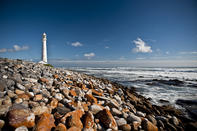Bloated, Corrupt and Inefficient
The Dutch East India Company "VOC" had been running the Cape as its own private fiefdom for close on 150 years. In that time the Company had become bloated, corrupt and inefficient, as big companies sometimes do, and a degree of tedium had settled over the whole enterprise.

By the last decade of the 1700’s, the once mighty Dutch East India Company was tottering on the edge of bankruptcy. It was a bad time for corporate weakness. The Trekboers were becoming increasingly restless, the wild Eastern frontier of the colony was up in arms, and even the little town of Swellendam had declared itself an Independent Republic.
To make matters worse, public tastes had turned away from Batavian tea to Caribbean coffee, and the company was losing revenue. And just to top everything off, Europe also happened to be in a state of major political upheaval, again.
Napoleon Trouble
As Europe was experiencing political upheaval again, it was Napoleon Bonaparte causing all the trouble. He was at the height of his power, wreaking havoc across the mainland, and the Peninsular Wars were in the offing. Britain had already established itself as Napoleon’s main adversary, and they were determined to stop the half-pint dictator from taking over Europe. In the throes of the titanic struggle that was to follow, many of the smaller European powers would became collateral damage.
Fighting with France was an occasional occurrence for the British. They had fought with the Bourbon royal house in the 1780’s and, after a brief lull, the old animosity was rekindled when a post-revolutionary Napoleon declared war on Britain and Holland in 1793. At first, the war went in Napoleon’s favour and, by 1795, the French armies were steadily advancing on Amsterdam.
The once popular Dutch royal House of Orange was about to topple, but William V, Duke of Orange, kept his head and fled to Britain, seeking asylum with his new allies. The British were happy to oblige and slyly suggested that they send out some troops, just to help protect Dutch foreign territories from a perceived French invasion.
Confusion and Mistrust
The Duke reluctantly signed the order from the British, on condition that all Holland’s possessions were to be handed back when peace was restored. The British said ‘sure’ and quickly dispatched a small armada of ships to the Cape, to prevent that Corsican upstart from taking control of Table Bay and the sea route to the East.
A few months later, the British fleet ceremoniously landed at Simonstown, and handed their writ of occupation to the Dutch East India Company officials. It was greeted with great suspicion. In those days, mail took three to six months to get from Europe to South Africa, and news of the Duke’s flight had not yet reached the Cape.
Besides, local loyalties were already split between the Dutch royalists and the Dutch republicans, and the British were known for pulling sneaky stunts to suit their own inscrutable motives. All in all, the arrival of the British threw the Cape into a state of great confusion and mistrust.
The British Disembarked
Then, a passing American ship brought some important news. Holland had fallen and become a puppet state of France. The Dutch homeland was henceforth to be known as the Batavian Republic of the Netherlands. This was great news for the Republican contingent at the Cape, who rallied at the news and declared themselves French allies. The crippled Dutch East India Company, for their part, was in no condition to resist and went along with popular opinion.
Accordingly, a ragged force of Cape soldiers was called out against the British invaders, and a brief but decisive battle was fought on the shores of Muizenberg on the 7 August 1795. This battle wasn’t much of a military encounter, however. The British just fired their cannons onto the shore, and the Dutch troops ran away. Nevertheless, the victorious British disembarked and triumphantly marched into Cape Town for their first tour of occupation. It lasted 7 years, from 1795 to 1802.
The new British authorities did their best to appease the Dutch inhabitants of their new demesne. They guaranteed religious freedom, they upheld the existing legal and monetary systems, including the rickety rix-dollar, and they even included many of the old officials in their new government.
Most importantly, they reduced the heavy taxation that the Dutch East India Company had levied on its subjects, and abolished the much hated system of monopolies that the corrupt Company had nurtured with its favoured suppliers. This won the British many fans who supported any new administration that could bring free-trade and a degree of solvency to the dwindling fortunes of the Cape of Good Hope.
By David Fleminger